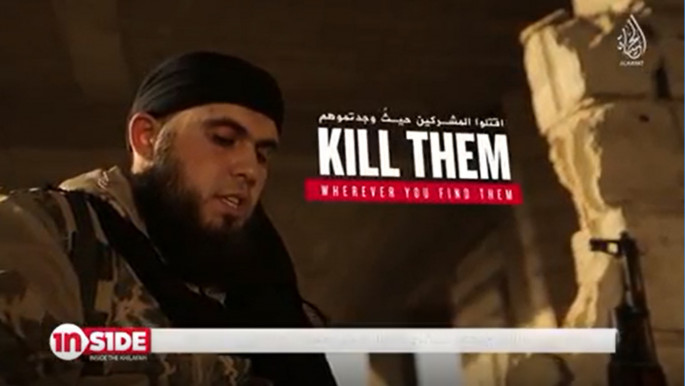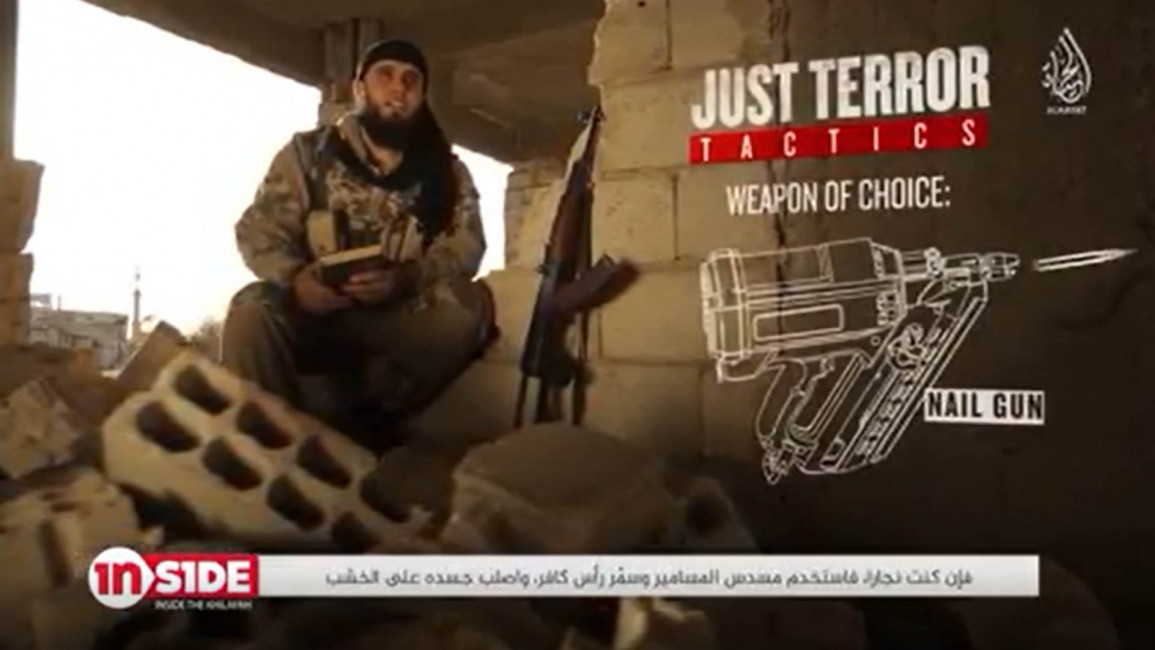
'Burn them in their homes': What IS' new propaganda video reveals about their changing strategy
In the video Abu Adam commands fellow Muslims to go to Marawi to join the ongoing fight between what he describes as the "Crusader" government and groups allied to Islamic State.
Marawi, a city in the south of the Philippines on the island of Mindanao, has been turned into a deadly street to street battleground between the Duterte government and Maute and Abu Sayyaf militant groups, who have pledged allegiance to Islamic State.
According to Philippine military figures, around 45 civilians have been killed in the crossfire. Propaganda videos show in graphic detail militants beheading captured government soldiers, and there are growing concerns that the Philippines will become the new focal point for IS recruitment.
For those unable to make "hijra" to Marawi, however, Abu Adam advocates a different set of lone wolf tactics: Muslims in Australia should take up any kind of weapon - be it a nail gun, petrol or driving trucks - to strike the "unbelieving Kuffah".
While he justifies action by pointing to the Australian government's military support for to the Philippines, there is little doubt that ordinary civilians are the target.
"Kill them, wherever you may find them", "burn them in their homes" he says, as voices sing in the background, "the Kuffah - we will slaughter them all". As he speaks into the camera, graphics are overlaid on the video with the weapons of choice.
 |
The slick, professional look of this video is akin to much of what al-Hayat media produces |  |
The bloodthirsty, twisted messages in the video are not new. Islamic State has always tried to appeal to followers using explicit violence and the slick, professional look of this video is very much akin to much of what al-Hayat media produces.
The video does, however, illustrate two important developments in the group's strategy.
 |
|
| The video crucially reiterates the dangerous narrative of carrying out lone wolf attacks at home [al-Hayat Media Centre screenshot] |
Firstly, it supports the idea that as Islamic State rapidly loses its strongholds in Syria and Iraq, the group is to some degree changing its regional focus increasingly towards South East Asia.
| Read more: Don't be deceived, the Islamic State group is losing | |
Just last month, Iraqi Armed Forces successfully retook Mosul, the group's last major bastion in Iraq. In Raqqa - once considered the group's de facto capital - Islamic State is currently engaged in a bitter fight for survival and yet Syria's northern city is only mentioned briefly, and resigns itself to the idea that only God can decide the outcome of the battle.
It is likely that the city will indeed by recaptured in the near future, with the Kurdish Syrian Democratic Forces, backed by the US having already "cleared about 45 percent of Raqqa since early June" according to Brett McGurk, US special envoy for the coalition against Islamic State.
Secondly, the video crucially reiterates the dangerous narrative of carrying out lone wolf attacks at home using any weapons at your dispense. These types of attacks are becoming all too familiar and present particular difficulties for the security services to detect.
 |
Lone wolf attacks give Islamic State the opportunity to appear omnipresent in countries impossible for it to set up an actual base |  |
Crucially, they give Islamic State the opportunity to appear omnipresent in countries impossible for it to set up an actual base. As I’ve written before in the case of the Manchester attack, although Islamic State called the attacker a "soldier of the Khalifah", nothing in the statement suggested any prior knowledge of the group - even getting the numbers of dead and injured wrong, and omitting the fact that Salman Abedi was martyred.
Nevertheless, to inspire such attacks is clearly an important part of their propaganda as the Islamic State rapidly loses ground. It means they are still associated with such atrocities against the "kuffah" without having to put in the same investment into vetting and training a recruit in Syria and sending them back.
 |
|
| Videos like Abu Adam's call to arms simply need to be shared online to reach thousands of potential recruits [al-Hayat Media Centre screenshot] |
Instead, videos like Abu Adam's call to arms simply need to be shared online to reach thousands of potential recruits. Although the tech giants have been cracking down on removing IS propaganda on YouTube, Facebook and Twitter - the encrypted messaging service Telegram still offers potential jihadis a forum to connect with other sympathisers and look at extremist material.
Unlike whatsapp, users can follow channels and join groups via invite links, thus allowing thousands - even unlimited with a telegram supergroup - of like-minded individuals to connect and spread information. While videos on YouTube are unlikely to last the hour and will thus have limited shareability, telegram channels are being constantly opened and shared.
 |
While videos on YouTube are unlikely to last the hour and will thus have limited shareability, telegram channels are being constantly opened and shared |  |
It may have moved more underground and may and at first glance seem difficult to find, but the propaganda value and the capacity to indoctrinate is very much still there.
It is this ability to adapt to new battlegrounds, both physical and virtual, that will give Islamic State a deeply concerning amount of staying power.
Gemma Fox is a Royal Television Society award-winning journalist who writes and produces film on the Middle East. Follow her on Twitter: @gemmafox257
Opinions expressed in this article remain those of the author and do not necessarily represent those of The New Arab, its editorial board or staff.




